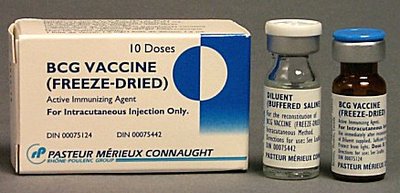BCG vaccine – The vaccine against tuberculosis
What is tuberculosis?
Tuberculosis – bacterial infection, caused by a bacterium Mycobacterium tuberculosis. The bacteria usually infects the lungs, but can also infect other parts of the body, such as kidney, spine or brain.
Tuberculosis is transmitted through coughing patient tuberculosis. When an infected person coughs or sneezes, the bacteria into the air and can be inhaled into the lungs of man, located near. Tuberculosis is most commonly spread through prolonged contact, eg, in family. However, short-term contact with the patient can also cause tuberculosis.
Children are at increased risk of tuberculosis infection. Because of this, TB prevention through vaccination is very important to children's health in countries, where tuberculosis is a common disease.
Tuberculosis is a major health problem all over the world, particularly in Africa. This is largely due to more people, patients AIDS. They have a higher risk of tuberculosis infection.
Symptoms of TB depend on, which develop bacteria in the body. Most often infected lungs. Symptoms of pulmonary tuberculosis infection include:
- Persistent cough for three weeks or longer;
- Chest pain;
- Coughing up blood or mucus;
- Weakness;
- Fatigue;
- Loss of appetite;
- Fever and chills;
- Night sweats.
Usually, tuberculosis can be treated successfully with antibiotics. Without treatment, the disease often leads to death.
What is BCG vaccine?
The vaccine bacillus Calmette-Guerin, or BCG prevents tuberculosis.
The vaccine contains live, attenuated bacteria. It is available as an injection into the muscle.

Who and when to be vaccinated against tuberculosis?
Vaccination should be carried out primarily in the following groups of individuals:
- Primarily designed for vaccination vaccination Children:
- In developing countries,;
- In developed countries, vaccination is carried out in some cases. For Example, a child may get the vaccine, if it is in contact with adults, suffering from tuberculosis, which can not be treated with drugs;
- Health care workers and people, who work in laboratories. Vaccination is usually carried out in the case of the probability of contact with tuberculosis bacteria, which does not respond to the use of drugs.
Vaccine, usually, administered once. In some cases, vaccination may be carried out twice.
Risks, associated with BCG vaccine
The vaccine may cause a false-positive reaction skin test for tuberculosis. It means, you can have a positive TB test, even if you're not sick. Blood tests can detect tuberculosis infection, which is independent of previous BCG vaccination.
Common side effects of the vaccine include:
- Hyperadenosis;
- Redness at the injection site;
- Fever;
- Bloody, frequent or painful urination;
- Abdominal discomfort and vomiting.
Very rarely you may experience more serious side effects, which can result in serious illness or death.
If you have symptoms of an allergic reaction (eg, rash, labored breathing) immediately seek medical advice.
Who should not be vaccinated against tuberculosis?
You should not be vaccinated following persons:
- With a weakened immune system, eg, they, who are infected HIV / AIDS;
- Passing an organ transplant;
- Pregnant.
Because TB is spread through the air, It is very important to the prevention of its transmission by airborne droplets .
What happens in the event of an outbreak of tuberculosis?
The spread of TB bacteria depends on the use of antibiotics and isolating people, who are infected. It is important to go through the whole course of antibiotics to kill bacteria and prevent from spreading to others.
